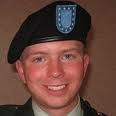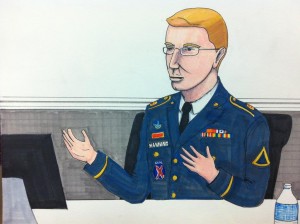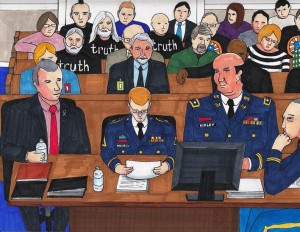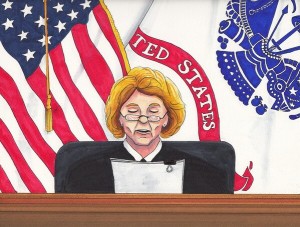We Must Not Fail Wikileaks Whistleblower Bradley Manning

This was the second time I had heard Manning testify. The first was his testimony about the abusive pre-trial incarceration he suffered for one year while being held in a cage in Kuwait and in solitary confinement in the Quantico Brig. I’ve now seen him testify for a total of 15 hours.

Bradley Manning testifying, sketched by Clark Stoeckley of the Bradley Manning Support Network
His testimony leads me to wonder: what would have happened to Bradley Manning if we had a decent educational system that included affordable, preferably free, college education so that young people weren’t driven to the military for economic reasons? What could Bradley Manning have given the country if he had been able to pursue his interests and natural talents? Would Manning have joined the military if the country was honest about how the US Empire operates around the world?
But, that was not to be. The country failed Bradley Manning.
I hope we do not fail him again.

Bradley Manning reading his plea statement in court, sketched by Clark Stoeckley of the Bradley Manning Support Network.
Manning made it clear last Thursday that he leaked the documents to Wikileaks because he saw serious problems in US foreign policy. Problems which are as serious as they can be: war crimes, criminal behavior at the highest levels up to Secretary of State Clinton, unethical behavior and bullying of other nations.
Manning’s sole purpose was to “spark a domestic debate on the role of the military and our foreign policy in general.”* He hoped the debate “might cause society to reevaluate the need or even the desire to engage in counterterrorism and counterinsurgency operations that ignore the complex dynamics of the people living in the effected environment every day.”
Regarding the collateral murder video which showed civilians, including two Reuters journalists being massacred, he said “I hoped that the public would be as alarmed as me about the conduct of the aerial weapons team crew members. I wanted the American public to know that not everyone in Iraq and Afghanistan are targets that needed to be neutralized, but rather people who were struggling to live in the pressure cooker environment of what we call asymmetric warfare.”
When discussing the State Department cables Manning saw that the US was not behaving the way the “de facto leader of the free world” should act as the cables “documented backdoor deals and seemingly criminal activity.” Again, he hoped for a change in policy as the “cables were a prime example of a need for a more open diplomacy” that would avoid conflict and save lives.
In some of these statements you get a hint of Manning’s empathy for fellow human beings. The incident that really showed it was his comments on David Frankel’s book “The Good Soldier,” where Frankel describes a seriously injured Iraqi civilian on the ground at the end of the Collateral Murder video. He lifts two fingers toward the soldier, a well-known sign of friendship, as he asks for help. The US soldier responds lifting his middle finger as the Iraqi died. Manning puts himself in the place of the Iraqi thinking his final act was an act of friendship only to be returned by a crude obscenity of unfriendliness. Manning acknowledges that this “burdens me emotionally.”
Manning was clear that he was solely responsible for his actions saying “The decisions that I made to send documents and information to the WLO [Wikileaks Organization] and website were my own decisions, and I take full responsibility for my actions.” He described his conversations with an anonymous person at Wikileaks but made it quite clear there was no espionage conspiracy between Manning and Julian Assange. His statement made it much more difficult for the US to prosecute Assange under the Espionage Act.
There is no question that Manning will spend years in jail. The ten charges he pled guilty to last week each carry two years for a total potential of 20 years incarceration. The government has announced it will still prosecute the espionage and aiding the enemy charges which could lead to a life sentence. This is an abuse of government power. They may be able to prove their case, but that does not mean he is truly guilty of those crimes, if convicted it will be another example of laws written to favor the prosecution; another example of injustice in today’s United States.

Judge Denise Lind. Sketch by Clark Stoeckley, Bradley Manning Support Network.
Judge Denise Lind has beautiful judicial decorum in court and shows she is on top of the details of the proceedings and the law. She is an impressive judicial figure but so far when there have been disputes between Manning and the government she has tended to split the difference, always giving a little more to the government. She has served in the Judge Advocate General’s Corps for 25 years, four as a judge. She is a product of a system that does not blow the whistle, does not go outside the chain of command and views following orders as a way of life. She will do what she thinks is just when she considers Manning’s case, but I doubt it will seem like justice to those of us who support Manning.
How can we avoid failing Bradley Manning? Ongoing support through the Bradley Manning Support Network continues to be essential but more than that, we need to do what we can to disseminate the information he leaked and work to create a national debate on a foreign policy that is seriously off-track.
This will be a long term effort, and as we pursue that work, we should never forget the young man who put his life and liberty on the line to give the world a glimpse of US foreign policy, a person who was failed by a country that talks about its concern for the young but does not do enough for them. Now, it is our job to pick up the materials Bradley has provided and work to create the better world we urgently need and he sought in his own patriotic way.
* All quotations are taken from the transcript of Manning’s testimony prepared by Alexa O’Brien as the court has not release his written statement to the public.
Kevin Zeese is an attorney who serves on the steering committee of the Bradley Manning Support Network. He also serves a co-director of It’s Our Economy. His twitter is @KBZeese.

